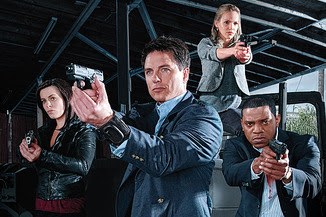Roger Jones on the Doctor Who season finale `The Wedding of River Song`
At least one thing` Closing Time` and `The Wedding of River Song` has done is silence the tedious cries from various quarters that ‘the Doctor has just committed casual genocide against the Silents’. There seems to be a Doctor Who fandom equivalent of Godwin’s Law (loosely, ‘there is a finite time in any internet discussion before someone makes an analogy to Hitler or the Nazis, at which point they have lost the argument’) whereby there is a rush to find genocidal or similar bad or dark behaviour in the central character. Just to be clear, giving a race enough power to recognise a predatory enemy and defend itself if not morally equivalent to genocide (after all, the predator can just out of your way, or else defend itself), nor is it likely to be efficient enough to remove a whole species. Sorry, rant over.
That said, the second half of the series (32? 6B? Smith 2? Apple petrichor?) has certainly had a slightly fannish obsession with the downside of being the Doctor. It cannot be said that this was not forewarned. When we were told how high the Doctor would rise and how low he would fall, I think many expected some huge and spectacular rise and fall all within `A Good Man Goes to War`. What we have actually seen has been far subtler; a fairly impressive rise in his ‘Coalition of the willing, and a couple of the coerced’ that managed, with heavy losses, to defeat two armies at Daemons Run. (And yes, I did think about whether or not to insert an apostrophe there – think of the rhyme!) The fall, however, was not the sudden reverse and kidnap of Melody Pond, but rather the slow erosion of the Doctor’s sense of self-worth and belief in his right to have companions. This is, in a way, old ground from the RTD era, and if I have any complaints about it as a plot arc it is that I would have anticipated more objections to the view from companions.





































